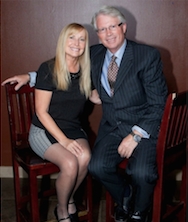The Secret to Strong Teams

Anyone who is in a leadership position knows that leadership requires patience and understanding. This is true whether the person has been a leader for years, or is only beginning to acquire leadership skills. It is also true whether the person is an employee or a business owner.
But what is it about leadership that demands so much patience and understanding? The answer is simple: people.
As Dale Carnegie, author of "How to Win Friends and Influence People" wrote, "When dealing with people, let us remember we are not dealing with creatures of logic. We are dealing with creatures of emotion, creatures bristling with prejudices and motivated by pride and vanity."
In his book, “Who Do You Think You Are Anyway?", author Dr. Robert A. Rohm tell us that true leaders are not picked, they pick themselves. This makes it all the more important to find a way to work effectively with a variety of personalities.
If the talented people on your team with unique personality styles do not feel supported, they will not reach their potential.
None of us want to lose a “leader in the rough” simply because we can't work with that individual. Rather than looking for weaker people who are easily led, what if we looked for stronger people and then helped them develop? Effective leaders can be found in every imaginable personality style.

Most people have predictable patterns of behaviour, their own distinctive ways of thinking, feeling and acting. That is what we mean when we refer to a personality style.
As Dr. Rohm tells us, because of our personality style, we respond to incidents in our life in predictable ways. You could say that we view life through certain filters.
There are various psychological tools that enable people to analyze, chart and understand their unique personality style. We can all benefit from understanding ourselves better. Self-understanding makes it so much easier to deal with life, and all the changes it involves.
Dr. Robert Rohm uses a system called DISC profiles to help people understand their personality style:
1. D type personalities enjoy being in charge and making things happen. Their personality style is Dominant, Driving, Doer.
2. I type personalities enjoy being around people, talking, telling stories, and having fun. Their personality style is Inspiring, Influencing, Impulsive.
3. S type personalities are satisfied simply by being part of the team. They are willing to take a supportive role. Their personality style is Steady, Stable, Supportive.
4. C type personalities are more systematic in their lifestyle and are very predictable in their behaviour. Their personality style is Competent, Cautious, Careful.
You can tell a person's style by how they behave in various situations. Behaviour is a strong clue. People fall into predictable patterns of behaviour, and those patterns are particularly clear during moments of stress.
The Carnegie Foundation, Harvard University and Stanford Research Institute did a research study on why people get jobs, keep jobs, and move ahead in their careers. According to this study, 15% of the reason is technical skills and knowledge. The other 85% has to do with people skills and people knowledge.
If you know your personality style and how to read personality styles in other people's behaviour, you will succeed in your career. Teams only work when the people involved understand and accommodate their differences. Leadership is the same.
The art of understanding yourself and others can help you develop stronger relationships, build more effective teams, and have a more productive life.
Spend time with your team. And don't be afraid to welcome people who have a personality style different from your own! If everyone on your team had the same personality style, they would compete.
Build a team of diverse people and they will complete one another.
As leaders, it's not what we leave to the people on our team that matters. It's what we leave in them. Spend time with your team, learn their personality styles, and learn to appreciate their skills. If you do, they will be inspired and some of the people on your team will become the unique leaders of the future.
Call to Action:
1. Take a leadership personality profile assessment. Learn about your personality. Develop an understanding of your strengths and weaknesses.
2. Seek to understand the unique personality of each member of your team.
3. Take time to develop your team, lead them, and inspire great leaders of the future.

The best is yet to come. It starts with you.
Your friends,
The UpCloseTeam




